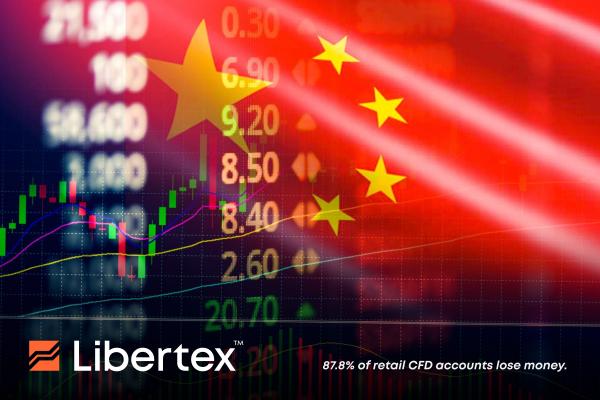Not too long ago, market analysts and economists were seemingly unanimous in their belief that this century would ultimately belong to China. The country's massive territory, population and industrial might would simply be unmatchable, they said. Surely, then, this should translate to huge stock gains for the companies driving this economic conquest. If this past year is anything to go by, it would appear not to be the case.
Chinese citizens returned from the Golden Week holidays this week to find both mainland and Hong Kong stocks down even further in what has become a relentless creep to ever-lower lows. Indeed, the Shanghai Composite (SSE) is down almost 20% YTD, while the Hang Seng has fallen a whopping 30% over the same period. But what is causing this apparent race to the bottom, and what can traders and investors do to protect or even grow their capital during these uncertain times?
Zero COVID = zero growth
We've no doubt heard all manner of stories of horror and absurdity associated with what has become perhaps China's most maligned policy. The most recent of these came just last month as overzealous lockdown enforcers prevented Chendu residents from evacuating their high-rise apartment blocks amid a 6.8 magnitude earthquake. However, nowhere has the impact of this misguided mantra been felt more than in the country's economy. Far from on target to reach its 5.5% annual growth target, Chinese GDP actually contracted 2.6% in Q3 2022.
Meanwhile, youth unemployment reached 19.3% in June of this year as many businesses put off hiring for new entry-level positions until the coronavirus uncertainty subsides. Like in the West, the tourism and leisure sectors have been completely decimated by the frequent city-wide lockdowns, and even tech and manufacturing have suffered due to the lower consumption this economic pain has entailed. Baidu (BIDU), for instance, has seen its online marketing business shrink by 6.5%, with Alibaba (BABA) experiencing the same decline. As a result, both of these big-name stocks are down 27% and 38% YTD, respectively.
Flaring geopolitical tensions
Between naval exercises and official visits to Taiwan, US-Chinese relations have become rather strained of late. Though US Secretary of State Antony Blinken reassured Chinese foreign minister Wang Yi that the US's 'One China' policy has not changed, it's easy to see how Beijing might interpret recent actions by Washington as signals to the contrary. In an escalation to the US-led trade war being waged on China, early October saw excessively draconian export controls introduced that will prevent Chinese companies from accessing the latest chip-making tools and components. The stated aim of this policy is to prevent China from developing next-generation AI technologies, and some have already dubbed it "an act of economic war". Now, the US has been restricting the sale of certain components to the likes of SMIC (down almost 20% YTD) since 2020, but these new regulations have tightened the vice even further.
Given that Biden has not ruled out providing military aid to Taiwan should it choose to declare independence, we cannot dismiss the possibility of an all-out proxy war in the future. Indeed, in a phone call with President Biden, Xi Jinping made clear that "those who play with fire will perish by it".
Where do we go from here?
While things may look bleak from here, it's far from all doom and gloom for the world's second-largest economy. The recent performance of the country's biggest consumer tech firms may look terrible now, but the good news is that the potential upside for the likes of Alibaba, Baidu and Tencent is virtually limitless. At their current prices of $75, $103 and $32, respectively, the ADRs of these Asian giants are sitting at levels visited in the early-to-mid 2010s. While there are fears of delisting to contend with, all of these companies are major players in future industries like cloud computing and AI, which one feels will have to generate positive economic results at some point down the line.
Also, as powerful as US sanctions are, they are much less effective against China. After all, China has a domestic market of over one billion people and maintains good relations with another similarly sized market in India. Chip sanctions, in particular, have actually seen SMIC's business grow, not shrink, with demand rising from within China and developing nations to plug any gap left by the US. With all of this in mind, we could well look back on these stock prices as generational buying opportunities in a decade. Only time will tell.
Trade CFDs on Chinese stocks with Libertex
Libertex is a well-known broker that offers both long and short positions on such CFDs as Alibaba, Tencent, Baidu and the iShares China Large Cap ETF, so you can have your say wherever you think the Chinese market is headed. Libertex also offers a wide range of CFDs on commodities, currencies, options and even crypto if your interest in stocks is quite low. For more information or to create an account of your own, simply visit www.libertex.com
Risk Warning: CFDs are complex instruments and come with a high risk of losing money rapidly due to leverage. 87.8% of retail investor accounts lose money when trading CFDs with this provider. You should consider whether you understand how CFDs work and whether you can afford to take the high risk of losing your money.


